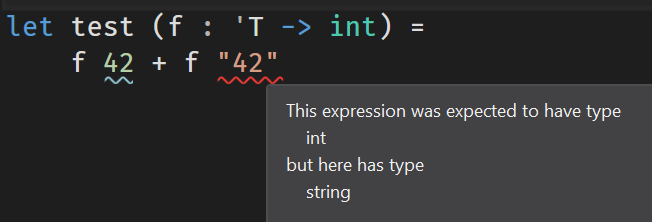TypeShape: Practical Generic Programming in F#
Eirik Tsarpalis
https://eiriktsarpalis.github.io/typeshape
About Me
Datatype Generic Programming
"Programs parameterized by shapes of datatypes"
Example
1:
|
|
1: 2: 3: 4: 5: 6: |
|
Another Example
1: 2: 3: 4: |
|
Yet Another Example
1: 2: 3: 4: |
|
Yet Another Example
1:
|
|
Implementing Print?
1:
|
|
Implementing Print
1: 2: 3: 4: 5: 6: 7: 8: |
|
That's Invalid .NET!
Reality?
Reality: Reflection
1: 2: 3: 4: 5: 6: 7: 8: 9: 10: 11: 12: 13: 14: 15: 16: 17: 18: |
|
Reflection: tedious, unsafe, ugly, slow.
TypeShape
- Library for generic programming
- Techniques originating from MBrace/FsPickler
- Founded on .NET Generics
Demo
Interlude: Existential Types
Universal Quantifiers
1:
|
|
1: 2: 3: |
|
Existential Quantifiers
1: 2: 3: |
|
Existential Packing
1: 2: 3: |
|
1:
|
|
Existential Packing
1: 2: |
|
Examples of Existential Packing in .NET?
1: 2: 3: 4: 5: |
|
Encoding Existential Packing
1: 2: 3: 4: 5: 6: |
|
Existential Unpacking
1: 2: 3: |
|
Again, not valid .NET code
Encoding Existential Unpacking in .NET?
Does this Work?
1:
|
|
Nope!
- Guessing the payload by passing a type argument.
- Wrong guesses result in runtime errors!
- Need to safely unpack the existential payload.
Existential Unpacking
1:
|
|
Rank-2 types
- The second argument is a Rank-2 lambda.
- Polymorphic on the input type.
F# lambdas are not Rank-2.

F# Lambdas
1: 2: |
|
A Rank-2 encoding
1: 2: 3: 4: 5: |
|
Encoding Existentials
1: 2: 3: 4: 5: 6: 7: 8: 9: 10: 11: 12: 13: |
|
Using Unpack
1: 2: 3: 4: 5: 6: 7: 8: 9: 10: 11: |
|
TypeShape as Existential Types
TypeShape
1: 2: 3: |
|
TypeShape
1: 2: 3: 4: 5: 6: 7: 8: 9: |
|
Generating Existentials
1: 2: 3: |
|
A Simple Example
1: 2: 3: |
|
1:
|
|
A Less Simple Example
1: 2: |
|
Objective: Implement the untyped version
1:
|
|
Using Reflection
1: 2: 3: 4: 5: 6: 7: 8: 9: 10: 11: 12: 13: 14: 15: 16: |
|
Using TypeShape
1: 2: 3: 4: 5: |
|
Other Shapes
Other Shapes
1: 2: 3: 4: 5: |
|
Other Shapes
1: 2: 3: 4: 5: 6: 7: 8: 9: |
|
Other Shapes
1: 2: 3: 4: 5: 6: 7: |
|
Other Shapes
1: 2: 3: 4: 5: |
|
Other Shapes
1: 2: 3: 4: 5: 6: 7: 8: 9: |
|
Other Shapes
1: 2: 3: 4: 5: 6: 7: |
|
Arbitrary Type Shapes
Code Lenses
1: 2: 3: 4: 5: |
|
Code Lenses
1: 2: 3: 4: 5: 6: 7: 8: 9: |
|
Field & Record Shapes
1: 2: 3: 4: 5: |
|
Union Shapes
1: 2: 3: |
|
Adding TypeShape to your project
1: 2: |
|
